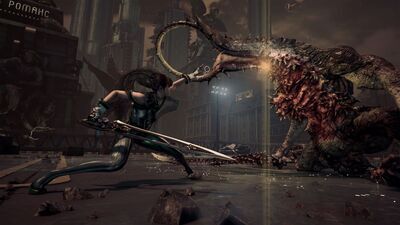It’s a game I was ready to discard as a disappointment relatively early, but that opened up right around then into something more ambitious and engaging. Some aspects still feel remarkably unrefined, but they become easier to ignore in favor of what does work about this odd RPG hybrid. It’s a weird game, but there’s something increasingly addictive about exploring its weirdness, battling Lovecraftian monsters on a mission to save the entire planet.
“Stellar Blade” is set deep in a future in which the planet has been overrun by creatures known as the Naytiba; you play Eve, a cyber-soldier sent back to Earth to try and reclaim it. In the game’s first encounter/tutorial, Eve loses her soldier partner, making her a lone wolf for the first few hours of the game. Set in a rain-shrouded city, you’re taught the basics of combat here, which is built around a light/heavy attack system that relies heavily on parrying and dodging. Timing a parry perfectly helps build a meter that unleashes special attacks that can be upgraded and customized through a skill tree. You have a drone partner who can help find items and objectives in the environment, but enemies and combat start to get very repetitive in the early hours , just before the game speeds Eve off to a new environment, gives her new friends, and eventually even new ranged weapons.

Once “Stellar Blade” really gets going, it’s a relatively familiar open-world/RPG structure wherein side missions can be alternated with the main story ones to gain items, currency, or skill points. Like a lot of games like this, some of the side missions are ridiculously simplistic—in one, I swear I literally just walked across the main city of Xion (the last standing on Earth) and walked back again. Still, the story missions start to take on an intriguing variety of game styles. The bulk of the story after here is set in what are basically dungeons, where the game becomes more of a traditional shooter and even a platformer. The shooting elements are fun, but the platforming ones can be infuriating in a game where jumping doesn’t always seem precise, and the basic physics are a bit janky. The difficulty spikes with some bosses can be a bit maddening, too.
Visually, “Stellar Blade” is a fascinating mash-up of elements that truly work with backgrounds that look nearly incomplete. Why make a game that has such strong visuals at times become a series of repetitive sand environments? Why do we have yet another body-part-exaggerated heroine who appears to have been designed by a team that has never seen an actual woman? And yet some of the creatures in this game are riveting, alien/zombie beings that look like they crawled out of the upside down on “Stranger Things” (I mean, just look at that thing in the still above, a boss that killed me many, many times). And some of the dungeons feel like descending into the Umbrella Corporation in an early “Resident Evil” game or movie. (That’s a compliment.) Like so many elements of “Stellar Blade,” everything that doesn’t work is balanced (or maybe that should be “parried”) by something that does.

